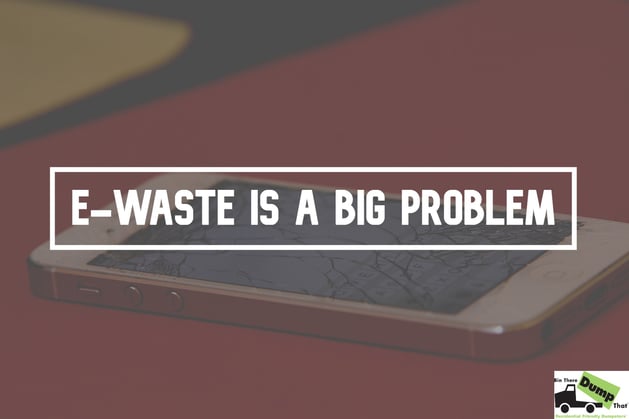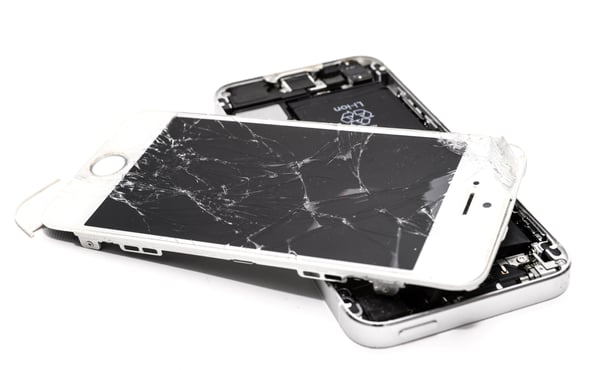Here’s a sobering statistic: Humans are producing 50 million tons of electronic waste (“e-waste”) each year.

Believe it or not, that number is growing. Your home is likely part of this larger problem.
The team over at Adepem put together this remarkable infographic that demonstrates the massive scale of e-waste (and how right to repair efforts can help resolve the issue). To put the problem of e-waste into perspective, we should remember that nearly 100% of electronics are recyclable, yet we only effectively recycle around 20% of our electronic waste at the moment.
Recycling typical household items like plastics, cardboard boxes, etc. can be easy when you rent a dumpster, but recycling those electronic products is a bit harder. Where does your old phone or laptop go when you upgrade to that new phone or laptop? Have you ever been offered the opportunity to repair or recycle (with a discount) your electronics goods in ways that would extend their life? What might happen if consumers had a real right to repair their electronic goods affordably (instead of buying new ones)?
This means that there’s plenty of room to solve this big problem. Luckily, there’s already a movement afoot to get it done.
Why More Recycling and Repair of Electronics is the Answer
So here’s the big challenge: We must address the other 80% of electronic waste that doesn’t currently get recycled.
To get that done, it will take a fair amount of behavior change from everyday citizens, governments, and the electronics industry.
The first thing to remember is that more recycling and reuse makes a ton of economic sense for consumers. People who buy electronics (i.e. most of us) stand to save a lot from better recycling and reuse efforts.
If consumers shift to recycling, repairing, and reusing electronics (over replacing them), the difference in cost is staggering. Let’s look a few examples:
- A refrigerator averages $290 to repair while it can cost up to $8000 to replace it on the high end
- A washing machine repair costs around $290 (on average) while replacing a washing machine can cost up to $1000
- A dryer repair averages $180 while replacing it can cost as much as $1000
Here you can see the major differences when it comes to costs for consumers.
So repair and reuse is such a no-brainer, why isn’t it happening more often?
A major contributing factor to the e-waste crisis is that it’s just too easy for people to upgrade their electronic device by purchasing a new device entirely rather than repairing existing devices or recycling them.
Imagine if companies were required to offer consumers significant discounts for returning and recycling older electronics. Even consider a world in which consumers could easily and cheaply repair or even upgrade existing electronic products at an affordable cost.
Now that it’s clear that repairing and replacing electronics is generally more cost effective (and better for the environment), what’s actually being done about it?
Right to Repair to the Rescue

Many governments, in partnership with the electronics industry, are putting “right to repair” legislation into effect lately. Such legislation makes it easier for people to reuse and recycle their electronic goods. Meanwhile, all three groups—citizens, government, and industry—are realizing that they each have a critical role to play in reducing electronic waste.
Here’s the big picture:
Everyday citizens need to be recycling and reusing electronics, or else the problem of e-waste just continues to grow and become more of an environmental disaster.
The electronics industry must make it easier for people to recycle and reuse electronics goods.
Governments must keep the environment as a top priority and make a big push for businesses and citizens to tackle the e-waste challenge.
Reducing electronic waste takes everyone working together to solve the issue.
At the end of the day, here’s what happens when electronics get recycled and reused: Consumers save a lot of money. Businesses and governments find new ways to work together. A major environmental crisis is solved without disruptive changes to our economy.
Right to repair sure sounds like a win-win for everybody.
Author: Paul Perry
Bio: Paul Perry is a writer for Adepem, a leading appliance parts supplier. With a background in education, and a passion for learning, Paul can be found traveling the globe, keeping relevant of world news and business practices.

